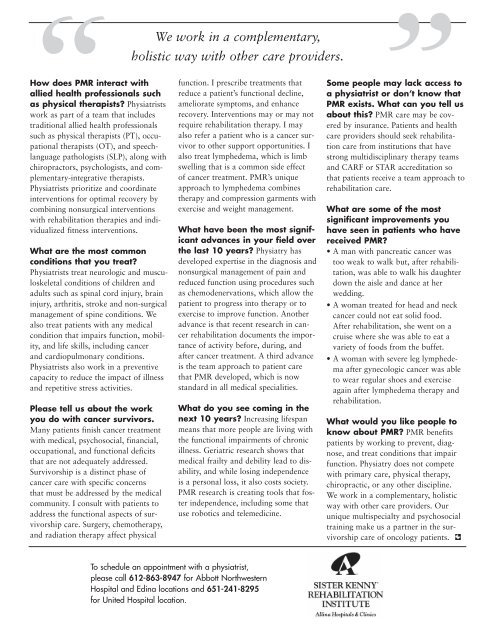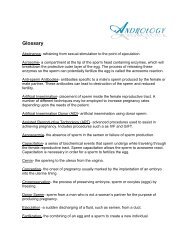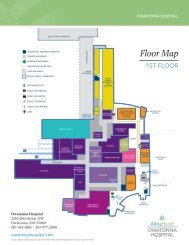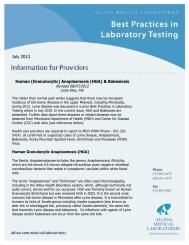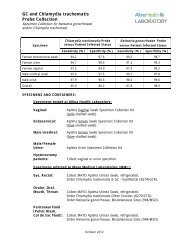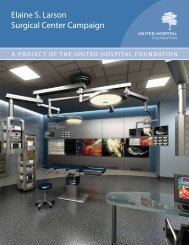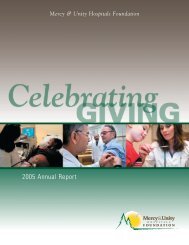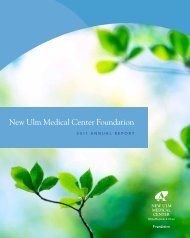Nancy Hutchison, MD, CLT-LANA - Allina Health
Nancy Hutchison, MD, CLT-LANA - Allina Health
Nancy Hutchison, MD, CLT-LANA - Allina Health
You also want an ePaper? Increase the reach of your titles
YUMPU automatically turns print PDFs into web optimized ePapers that Google loves.
“ ”<br />
How does PMR interact with<br />
allied health professionals such<br />
as physical therapists? Physiatrists<br />
work as part of a team that includes<br />
traditional allied health professionals<br />
such as physical therapists (PT), occupational<br />
therapists (OT), and speechlanguage<br />
pathologists (SLP), along with<br />
chiropractors, psychologists, and complementary-integrative<br />
therapists.<br />
Physiatrists prioritize and coordinate<br />
interventions for optimal recovery by<br />
combining nonsurgical interventions<br />
with rehabilitation therapies and individualized<br />
fitness interventions.<br />
What are the most common<br />
conditions that you treat?<br />
Physiatrists treat neurologic and musculoskeletal<br />
conditions of children and<br />
adults such as spinal cord injury, brain<br />
injury, arthritis, stroke and non-surgical<br />
management of spine conditions. We<br />
also treat patients with any medical<br />
condition that impairs function, mobility,<br />
and life skills, including cancer<br />
and cardiopulmonary conditions.<br />
Physiatrists also work in a preventive<br />
capacity to reduce the impact of illness<br />
and repetitive stress activities.<br />
Please tell us about the work<br />
you do with cancer survivors.<br />
Many patients finish cancer treatment<br />
with medical, psychosocial, financial,<br />
occupational, and functional deficits<br />
that are not adequately addressed.<br />
Survivorship is a distinct phase of<br />
cancer care with specific concerns<br />
that must be addressed by the medical<br />
community. I consult with patients to<br />
address the functional aspects of survivorship<br />
care. Surgery, chemotherapy,<br />
and radiation therapy affect physical<br />
We work in a complementary,<br />
holistic way with other care providers.<br />
function. I prescribe treatments that<br />
reduce a patient’s functional decline,<br />
ameliorate symptoms, and enhance<br />
recovery. Interventions may or may not<br />
require rehabilitation therapy. I may<br />
also refer a patient who is a cancer survivor<br />
to other support opportunities. I<br />
also treat lymphedema, which is limb<br />
swelling that is a common side effect<br />
of cancer treatment. PMR’s unique<br />
approach to lymphedema combines<br />
therapy and compression garments with<br />
exercise and weight management.<br />
What have been the most significant<br />
advances in your field over<br />
the last 10 years? Physiatry has<br />
developed expertise in the diagnosis and<br />
nonsurgical management of pain and<br />
reduced function using procedures such<br />
as chemodenervations, which allow the<br />
patient to progress into therapy or to<br />
exercise to improve function. Another<br />
advance is that recent research in cancer<br />
rehabilitation documents the importance<br />
of activity before, during, and<br />
after cancer treatment. A third advance<br />
is the team approach to patient care<br />
that PMR developed, which is now<br />
standard in all medical specialities.<br />
What do you see coming in the<br />
next 10 years? Increasing lifespan<br />
means that more people are living with<br />
the functional im pair ments of chronic<br />
illness. Geriatric research shows that<br />
medical frailty and debility lead to disability,<br />
and while losing independence<br />
is a personal loss, it also costs society.<br />
PMR research is creating tools that foster<br />
independence, including some that<br />
use robotics and telemedicine.<br />
To schedule an appointment with a physiatrist,<br />
please call 612-863-8947 for Abbott Northwestern<br />
Hospital and Edina locations and 651-241-8295<br />
for United Hospital location.<br />
Some people may lack access to<br />
a physiatrist or don’t know that<br />
PMR exists. What can you tell us<br />
about this? PMR care may be covered<br />
by insurance. Patients and health<br />
care providers should seek rehabilitation<br />
care from institutions that have<br />
strong multidisciplinary therapy teams<br />
and CARF or STAR accreditation so<br />
that patients receive a team approach to<br />
rehabilitation care.<br />
What are some of the most<br />
significant improvements you<br />
have seen in patients who have<br />
received PMR?<br />
A man with pancreatic cancer was<br />
too weak to walk but, after rehabilitation,<br />
was able to walk his daughter<br />
down the aisle and dance at her<br />
wedding.<br />
A woman treated for head and neck<br />
cancer could not eat solid food.<br />
After rehabilitation, she went on a<br />
cruise where she was able to eat a<br />
variety of foods from the buffet.<br />
A woman with severe leg lymphedema<br />
after gynecologic cancer was able<br />
to wear regular shoes and exercise<br />
again after lymphedema therapy and<br />
rehabilitation.<br />
What would you like people to<br />
know about PMR? PMR benefits<br />
patients by working to prevent, diagnose,<br />
and treat conditions that impair<br />
function. Physiatry does not compete<br />
with primary care, physical therapy,<br />
chiropractic, or any other discipline.<br />
We work in a complementary, holistic<br />
way with other care providers. Our<br />
unique multispecialty and psychosocial<br />
training make us a partner in the survivorship<br />
care of oncology patients.


